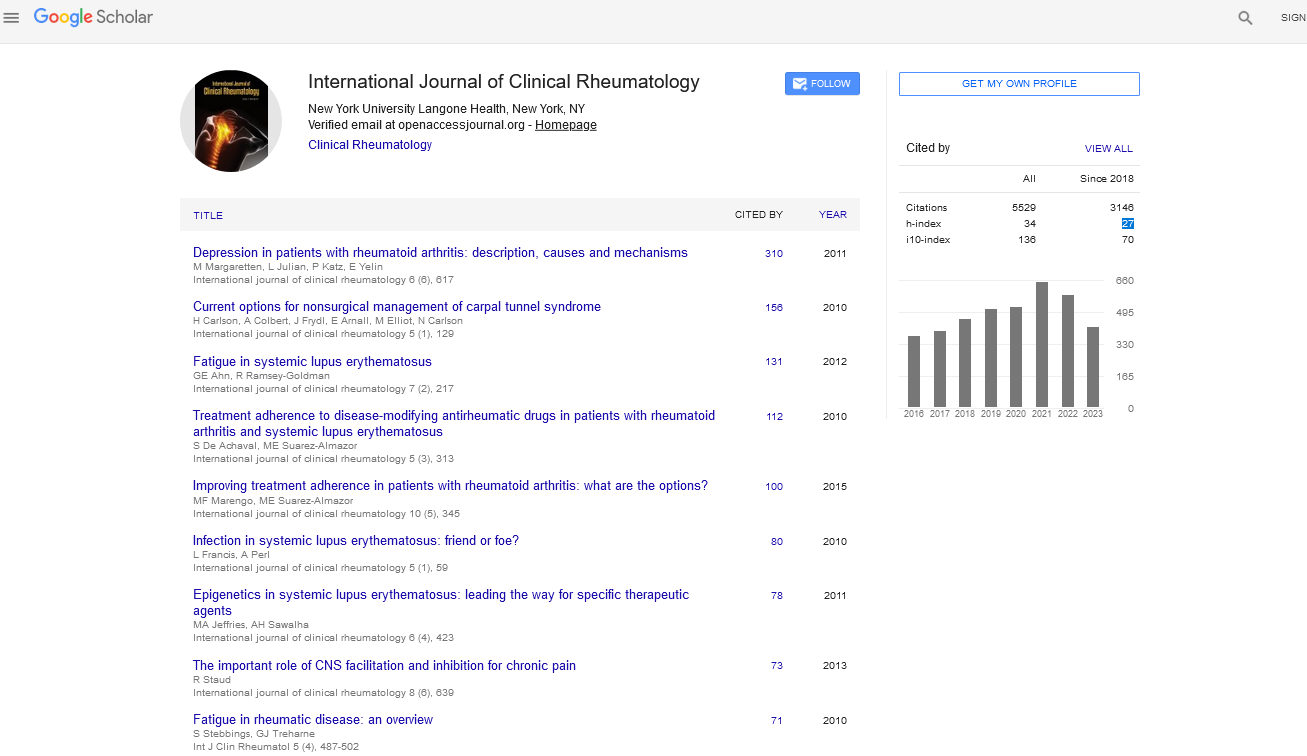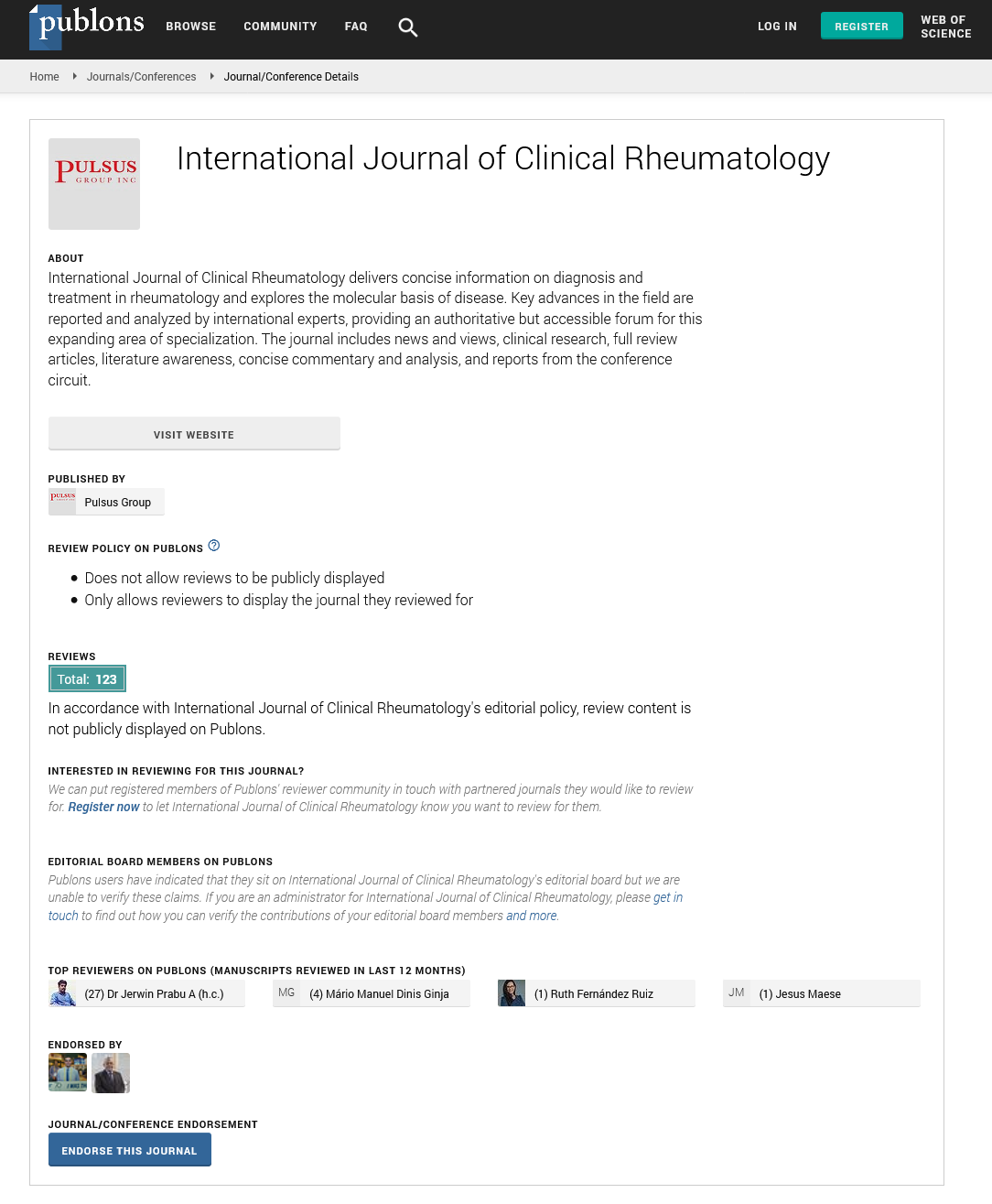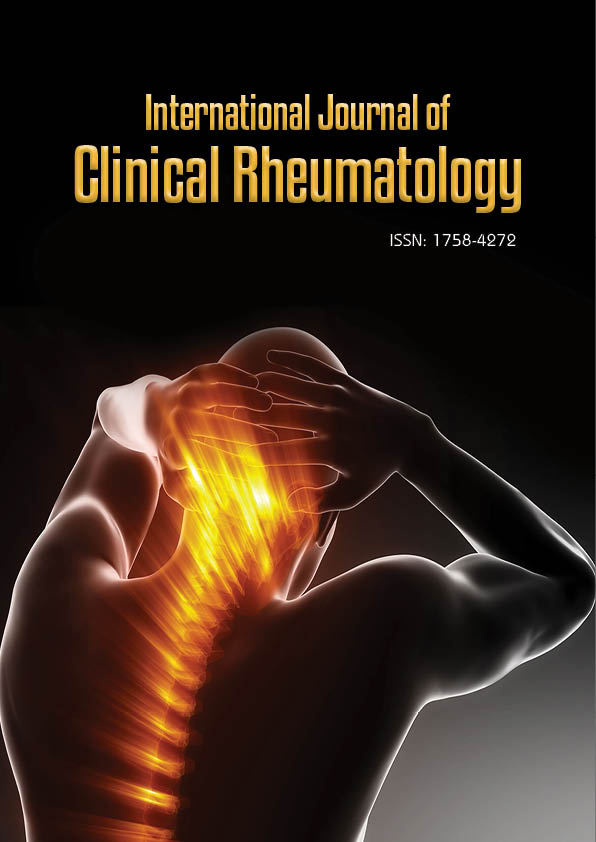Expert Review - International Journal of Clinical Rheumatology (2024) Volume 19, Issue 5
The Impact of Lifestyle Modifications on Spondyloarthritis Disease Activity
Juan Pablo Ramirez*
Department of Rheumatology, National University of Colombia, Bogotá, Colombia
- *Corresponding Author:
- Juan Pablo Ramirez
Department of Rheumatology, National University of Colombia, Bogotá, Colombia
E-mail: Ramirez_jp69@gmail.com
Abstract
Spondyloarthritis (SpA) is a group of inflammatory rheumatic diseases primarily affecting the spine and sacroiliac joints, leading to chronic pain and disability. While pharmacological treatments play a crucial role in managing disease activity, lifestyle modifications such as diet, exercise, and smoking cessation are increasingly recognized for their potential impact on disease outcomes. This study aims to evaluate the impact of lifestyle modifications on disease activity in patients with spondyloarthritis, focusing on the effects of dietary changes, physical exercise, and smoking cessation. We conducted a systematic review of recent clinical trials, cohort studies, and observational research evaluating the effects of lifestyle modifications on SpA disease activity. Outcomes assessed include changes in disease activity scores, functional status, and quality of life. The review indicates that lifestyle modifications have a notable impact on SpA disease activity. Regular physical exercise and specific dietary interventions, such as an anti-inflammatory diet, are associated with reduced disease activity, improved functional outcomes, and enhanced quality of life. Smoking cessation also shows positive effects on disease control and overall health. Lifestyle modifications, including exercise, dietary changes, and smoking cessation, are beneficial adjuncts to pharmacological treatment in managing spondyloarthritis. These interventions can enhance disease control, improve functional outcomes, and contribute to overall well-being. Integrating lifestyle modifications into SpA management strategies may offer substantial benefits and should be encouraged alongside conventional therapies.
Keywords
Spondyloarthritis • Lifestyle modifications • Disease activity • Exercise • Diet
Introduction
Spondyloarthritis (SpA) is an inflammatory rheumatic disorder that primarily affects the axial skeleton, including the spine and sacroiliac joints. Characterized by chronic back pain, stiffness, and reduced spinal mobility, SpA encompasses several related conditions, including ankylosing spondylitis (AS), psoriatic arthritis (PsA), and reactive arthritis (ReA) [1]. The management of SpA typically involves a combination of pharmacological treatments, such as nonsteroidal anti-inflammatory drugs (NSAIDs) and biologics, and physical therapy to alleviate symptoms and improve function. Recent research has increasingly highlighted the role of lifestyle modifications in managing inflammatory conditions, including SpA [2]. Lifestyle factors such as diet, physical activity, and smoking habits have been shown to influence disease activity and overall health outcomes. The integration of lifestyle interventions into traditional treatment regimens may offer additional benefits beyond what is achieved with pharmacotherapy alone. Dietary modifications, such as adopting an anti-inflammatory diet rich in omega-3 fatty acids and low in processed foods, may help in reducing systemic inflammation. Regular physical exercise is known to improve flexibility, reduce pain, and enhance functional capacity in patients with SpA. Additionally, smoking cessation is associated with improved disease control and reduced inflammatory markers. This study aims to review the impact of these lifestyle modifications on disease activity in patients with spondyloarthritis. By examining current evidence from clinical trials and observational studies, we seek to determine how lifestyle changes can complement pharmacological treatments and improve patient outcomes. Understanding the effects of lifestyle modifications on SpA disease activity could lead to more comprehensive management strategies and better overall patient care [3-5].
Discussion
Impact of physical exercise
Physical exercise has been widely recognized as a cornerstone of managing spondyloarthritis (SpA). Regular physical activity helps maintain spinal mobility, reduce stiffness, and improve overall functional capacity. Exercise programs tailored to SpA patients often include stretching, strengthening exercises, and aerobic activities. Evidence from clinical trials suggests that patients who engage in regular exercise experience reductions in disease activity scores, improvements in pain management, and enhanced quality of life [6].
For instance, studies have demonstrated that structured exercise programs lead to significant improvements in the Bath Ankylosing Spondylitis Disease Activity Index (BASDAI) and the Bath Ankylosing Spondylitis Functional Index (BASFI). These improvements are attributed to the reduction in inflammation and enhancement of spinal flexibility achieved through consistent physical activity. Moreover, exercise helps counteract the detrimental effects of physical inactivity, which can exacerbate symptoms and contribute to disability.
Dietary modifications
Diet plays a significant role in modulating inflammation and disease activity in SpA. Adopting an anti-inflammatory diet, which emphasizes whole foods, omega-3 fatty acids, and antioxidants while reducing processed foods and sugars, has been associated with beneficial outcomes. Research indicates that dietary changes can lead to improvements in disease markers and overall disease activity.
For example, a diet rich in omega-3 fatty acids, found in fatty fish and flaxseeds, has been linked to reduced levels of inflammatory markers such as C-reactive protein (CRP) and erythrocyte sedimentation rate (ESR). Similarly, the Mediterranean diet, which is high in fruits, vegetables, and whole grains, has shown promise in reducing inflammation and improving patient-reported outcomes. While dietary interventions alone may not replace pharmacological treatments, they offer a complementary approach to managing disease activity and enhancing overall health [7-9].
Smoking cessation
Smoking is known to exacerbate inflammation and negatively impact disease activity in SpA. Numerous studies have reported that smokers with SpA tend to have higher disease activity scores, increased pain, and reduced response to treatment compared to non-smokers. Smoking cessation is associated with improvements in disease control and overall health outcomes.
Evidence suggests that quitting smoking can lead to significant reductions in disease activity and improved response to pharmacological treatments. The benefits of smoking cessation extend beyond disease management, contributing to overall health improvements, including reduced cardiovascular risk and better respiratory function.
Challenges and considerations
While lifestyle modifications offer substantial benefits, integrating these changes into routine care presents challenges. Adherence to lifestyle interventions can be influenced by various factors, including patient motivation, access to resources, and the presence of comorbid conditions. Additionally, lifestyle modifications should be personalized to individual patient needs and preferences to maximize their effectiveness.
Healthcare providers play a critical role in supporting patients through lifestyle changes by providing education, resources, and encouragement. Collaborative care approaches that involve dietitians, physical therapists, and smoking cessation programs can enhance the implementation of these interventions and improve patient outcomes.
Further research is needed to better understand the long-term effects of lifestyle modifications on disease activity in SpA. Large-scale, randomized controlled trials evaluating the impact of specific dietary interventions, exercise regimens, and smoking cessation programs on SpA outcomes will provide more definitive evidence. Additionally, exploring the mechanisms through which lifestyle changes influence disease activity can help refine treatment strategies and improve patient care [10].
References
- Goodson NJ, Symmons DM, Scott DI et al. Baseline levels of C-reactive protein and prediction of death from cardiovascular disease in patients with inflammatory polyarthritis: a ten-year followup study of a primary care-based inception cohort. Arthritis Rheum.52,2293-9(2005).
- Arima H, Koirala S, Nema K et al. High prevalence of rheumatoid arthritis and its risk factors among Tibetan highlanders living in tsarang, mustang district of Nepal. J Physiol Anthropol. 41-12 (2022).
- Drosos GC, Vedder D, Houben E et al. EULAR recommendations for cardiovascular risk management in rheumatic and musculoskeletal diseases, including systemic lupus erythematosus and antiphospholipid syndrome. Ann Rheum Dis. 81,768-79 (2022).
- Agca R, Heslinga SC, Rollefstad S et al. EULAR recommendations for cardiovascular disease risk management in patients with rheumatoid arthritis and other forms of inflammatory joint disorders: 2015/2016 update. Ann Rheum Dis. 76,17-28 (2017).
- Błyszczuk P, Szekanecz Z. Pathogenesis of ischaemic and non-ischaemic heart diseases in rheumatoid arthritis. RMD Open.6-e001032 (2020).
- Solomon A, Stanwix AE, Castaneda S et al. Points to consider in cardiovascular disease risk management among patients living in South Africa, an unequal middle-income country. BMC Rheumatol.4-42 (2020).
- Sofogianni A, Stalikas N, Antza C et al. Cardiovascular Risk Prediction Models and Scores in the Era of Personalized Medicine. J Pers Med. 20,12-1180 (2022).
- Ndrepepa G, Kastrati A. Gamma-glutamyl transferase and cardiovascular disease. Ann Transl Med. 4-481 (2016).
- Emdin M, Pompella A, Paolicchi A. Gamma-glutamyltransferase, atherosclerosis, and cardiovascular disease: triggering oxidative stress within the plaque. Circulation. 112,2078-80 (2005).
- Grundy S. Gamma-glutamyl transferase another biomarker for metabolic syndrome and cardiovascular risk. Arterioscler Thromb Vasc Biol .27,4-7(2007).
Indexed at, Google Scholar, Crossref
Indexed at, Google Scholar, Crossref
Indexed at, Google Scholar Crossref
Indexed at, Google Scholar, Crossref
Indexed at, Google Scholar, Crossref
Indexed at, Google Scholar, Crossref
Indexed at, Google Scholar, Crossref
Indexed at, Google Scholar, Crossref
Indexed at, Google Scholar, Crossref


